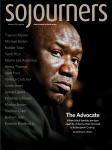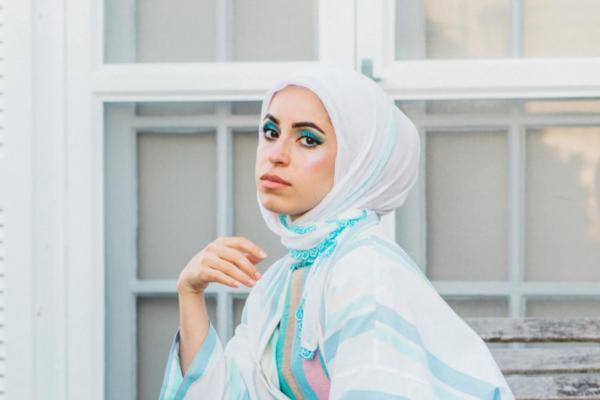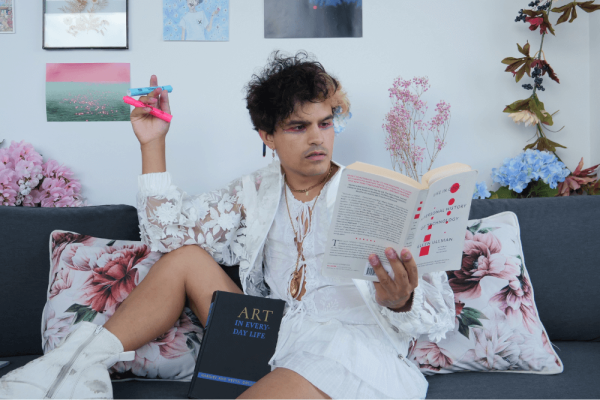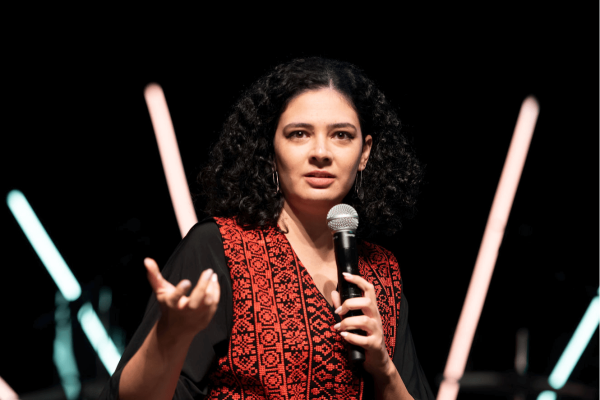SYRIAN. AMERICAN. Muslim. Woman. These distinctions of religion, geography, and gender are sometimes considered worlds of their own, but rapper Mona Haydar is used to navigating between them as a daughter of Syrian immigrants to the U.S. who grew up in Flint, Mich. Her experiences of embodying a multicultural identity in a country teeming with bigotry are the basis of her new EP, Barbarican, a collection of powerful songs that challenge rigid notions about who gets to consider themselves American and who gets left out and called a barbarian.
Haydar emerged onto the music scene in March 2017 when she released a colorful music video for her song “Hijabi (Wrap My Hijab).” The video featured her, eight months pregnant, surrounded by hijab-clad women as she rapped about diversity and the freedom to practice hijab, an often-criticized tradition in the West. Billboard named “Hijabi (Wrap My Hijab)” one of the best protest songs of 2017, creating anticipation for more music from Haydar. With Barbarican, Haydar has delivered a searing follow-up.
Opening with the line, “If they’re civilized, I’d rather stay savage,” Barbarican celebrates the colonized, specifically those who have suffered from the racist equating of “brown” and “black” to “backward” and “barbarian,” and “modern” to “white.”
In the song “Barbarian,” Haydar examines the ways in which colonialism seeps into the minds of people of color, teaching them to hate aspects of themselves. With dynamic beats and catchy refrains, she creatively subverts colonialism by using its own words against it. Haydar even fights stigma surrounding mental health, by wrestling with both her experience of postpartum depression in her song “Lifted” and her reaction to the suicide of a friend in “Suicide Doors,” which features singer-songwriter Drea d’Nur.
Haydar has a degree in Christian ethics from Union Theological Seminary, where she studied with black liberation theologian James Cone. She references her degree in the song “Miss Me,” which features Syrian-American hip-hop artist and peace activist Omar Offendum and addresses others’ dislike of her religion. “Praying for your soul to be saved from white supremacy. But you always come for me. Masters in theology. White Jesus isn’t saving me.”
“Miss Me” illuminates a cruel irony: Even social justice-minded Christians who think they’ve helped to “liberate” the Muslim woman from stereotypes have just put her in a new box. She’s only allowed to be an activist, only allowed to talk to us about her concerns, when having a Muslim perspective is valuable to our social justice initiatives.
In Barbarican, Haydar expresses indignation at white supremacy’s ability to terrorize the bodies of women of color and later profit from them. To highlight this, Haydar uses the examples of the white celebrity Kylie Jenner’s lip kits, makeup products designed to make lips bigger. In a world where women from “the East” are veiled caricatures that eat spiced food with henna-marked hands, the only way our features can be recognized and celebrated is if they are appropriated by white women.
Listening to Haydar’s lyric, “They don’t want to see me as American,” in the song “American,” I remember times when I haven’t felt “Indian enough” or “American enough.” Haydar doesn’t forsake one of her identities for the other, but instead holds them in tension, showing that there is space in the world for nonwhite and non-Christian Americans. She radically centers and normalizes the lives of people who live in the margins. By healing their wounds, she takes their power back from their conquerors.
“We don’t let them win,” she says in her EP’s opening track. “We’re beautiful barbarians.”

Got something to say about what you're reading? We value your feedback!







